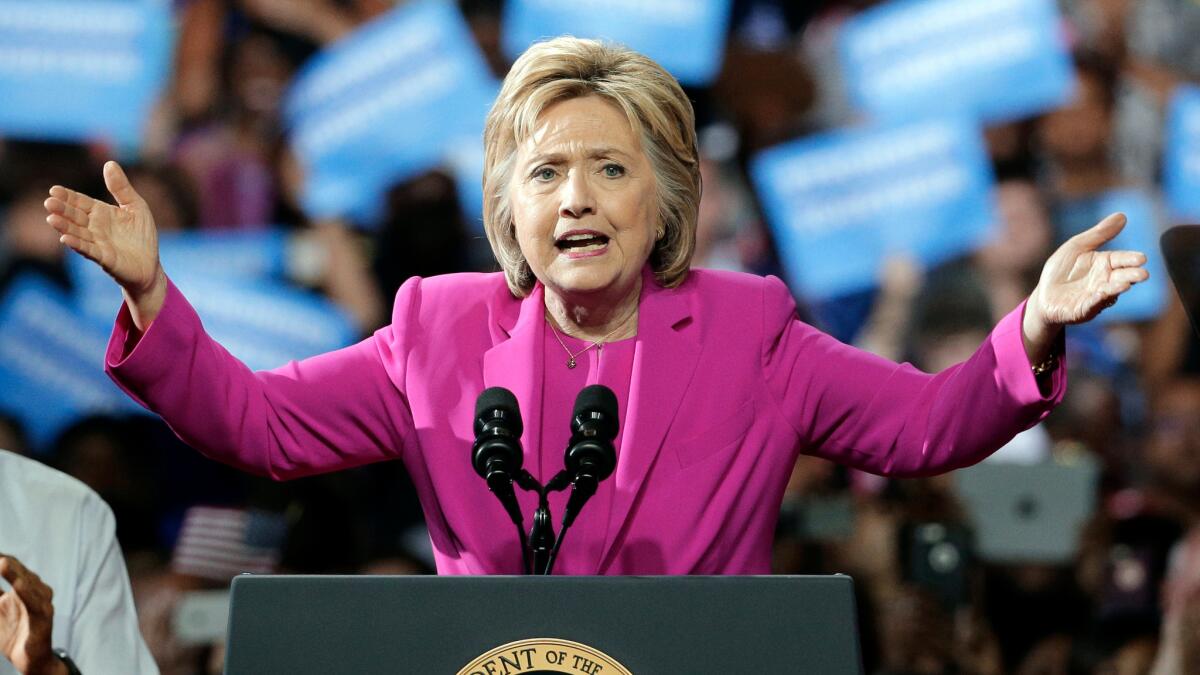Editorial: FBI Director outlines a persuasive case against indicting Clinton, but the decision isn’t his to make

In what he acknowledged was an unusually public recommendation, FBI Director James B. Comey on Tuesday urged the Justice Department not to prosecute Hillary Clinton for what Comey called her “extremely careless” handling of classified information on a private email account.
In other words, after an exhaustive, full-year investigation, the FBI concluded what we suspected from the start: Clinton showed a considerable lack of judgment and, in the process, she skirted up against the laws governing the treatment of classified information. But in the end, she did not behave in a manner that merited criminal prosecution. As Comey put it — persuasively — “no reasonable prosecutor” would bring criminal charges in this case.
Even if the Justice Department takes no action, that doesn’t exonerate Clinton of the scandalously poor judgment she demonstrated in deciding to conduct official State Department business over an email account housed on a private server. Even as he recommended against filing criminal charges against Clinton, Comey offered damning details about the problems created by that go-it-alone policy. For example, he noted that seven email chains concerned matters that were classified at the “Top Secret/Special Access Program” level when they were sent and received.
Comey also said “a very small number” of emails bore markings indicating the presence of classified information, which seems to contradict Clinton’s insistence that she never sent or received emails marked classified. It is disturbing that Clinton was not upfront and transparent about her actions from the start; surely, that will only deepen the distrust some voters already feel for her.
Yet, despite these findings, Comey concluded that “no reasonable prosecutor” would bring charges against Clinton for violating laws that make it a crime to mishandle classified information either intentionally or in a grossly negligent way. His explanation for that conclusion was compelling and, given the political high stakes, he was right to go public with his recommendation.
See the most-read stories this hour »
Much of his argument turned on precedent. While the FBI found evidence of “potential violations” of the law, Comey said, they didn’t involve the very serious factors that had made many previous prosecutions worth bringing, such as “clearly intentional and willful mishandling of classified information,” “vast quantities of materials exposed in such a way as to support an inference of intentional misconduct” or “indications of disloyalty to the United States.” He also implied that a prosecution would be inadvisable because of the insufficiency of the evidence, “especially regarding intent.”
Although it’s true that the law allows for prosecution of grossly negligent mishandling of classified information, it does not require it. Prosecutors have great discretion in deciding when to bring a case and when not to, and Comey is right to emphasize the importance of intent. Requiring proof of criminal intent is a vital safeguard against overzealous prosecution. And subjecting Clinton to a higher standard than was applied in other cases would be unjust.
The FBI’s recommendation acquires additional credibility from the fact that Comey is a former deputy attorney general in the George W. Bush administration widely respected for his integrity. But in the end, as Comey himself emphasized, it is only a recommendation. The final decision about whether to prosecute Clinton lies not with the investigators at the FBI but with the lawyers at the Justice Department, and therein lies a problem.
It is absolutely essential that voters believe that decision was made fairly and independently and nonpolitically. Unfortunately, Atty. Gen. Loretta Lynch’s now-well-known meeting with Bill Clinton for 30 minutes last week in Phoenix has raised questions about her independence. Although Lynch said the two engaged only in small talk about golf and grandchildren, Republicans — including Donald Trump — have cried foul. (Trump tweeted: “Only a fool would believe that the meeting between Bill Clinton and the U.S.A.G. was not arranged or that Crooked Hillary did not know.”)
Last week, Lynch indicated that she would defer to the judgment of the FBI and career prosecutors, saying, “I will be accepting their recommendations and their plan going forward.” But later, a Justice Department spokeswoman muddied matters by saying that Lynch would have “ultimate responsibility for any decision.”
We have some sympathy for Lynch, who didn’t solicit a meeting with Bill Clinton and who can’t fairly be described as a Clinton crony. But given the fact that Republicans will place a sinister construction on any participation by Lynch in a decision not to charge Hillary Clinton, the attorney general should unambiguously recuse herself and allow Deputy Atty. Gen. Sally Yates to make the call.
Even if the Justice Department follows Comey’s advice, Clinton’s private email server will be an issue in the presidential campaign. That is the price Clinton must pay — along with the protracted FBI investigation that just concluded — for a thoughtless decision that violated the spirit if not the letter of the law and needlessly compromised the confidentiality of sensitive communications. Those who admire Clinton and support her candidacy can hope that this episode has taught her a lesson about the importance of accountability.
Follow the Opinion section on Twitter @latimesopinion and Facebook
MORE FROM OPINION
A letter from 2056: Utopian L.A. is where everyone wants to live
A letter from 2056: Dystopian L.A. gives you everything you love to hate, only more of it
Boycotts of Israel are a protected form of free speech
More to Read
A cure for the common opinion
Get thought-provoking perspectives with our weekly newsletter.
You may occasionally receive promotional content from the Los Angeles Times.










